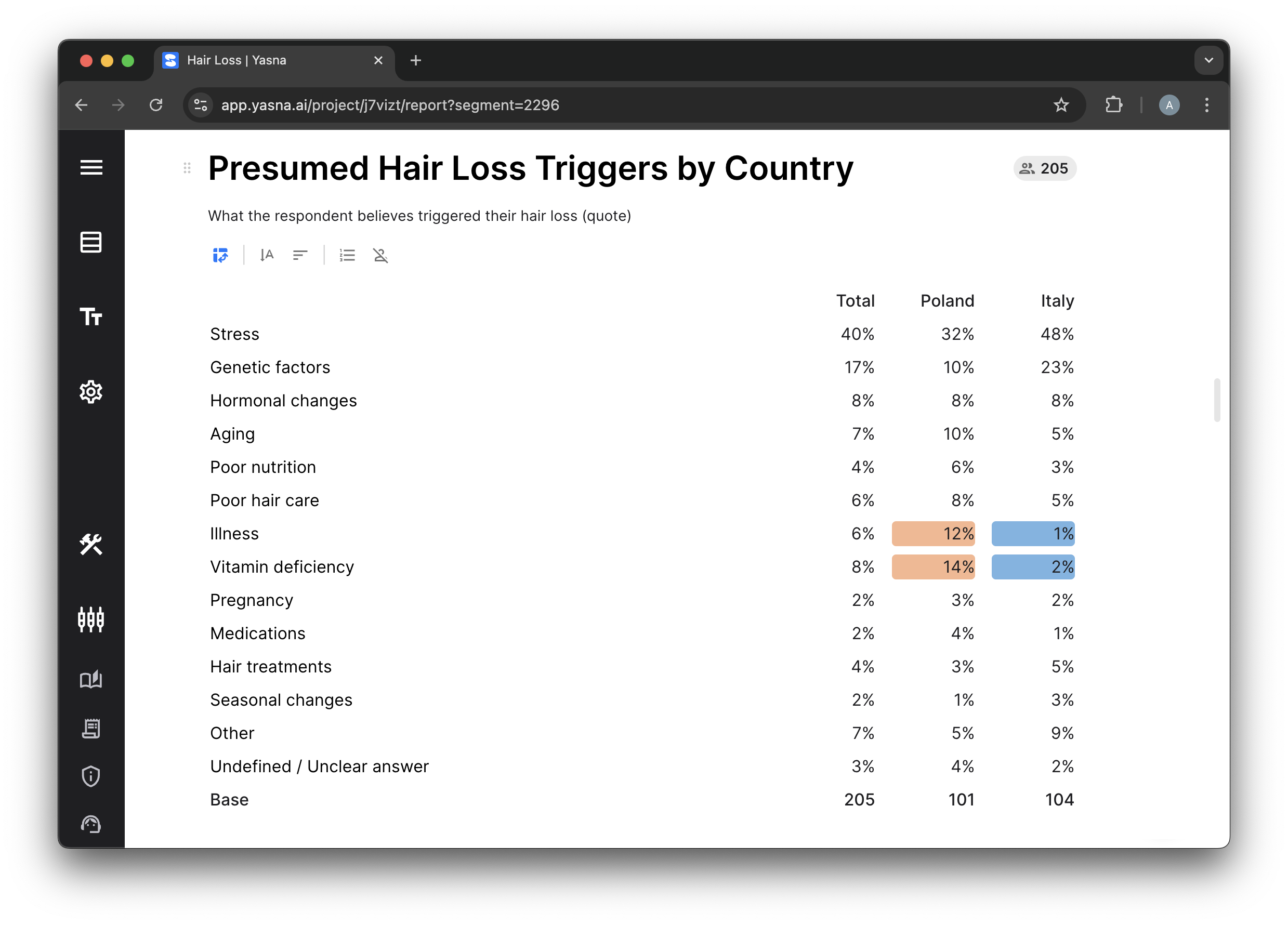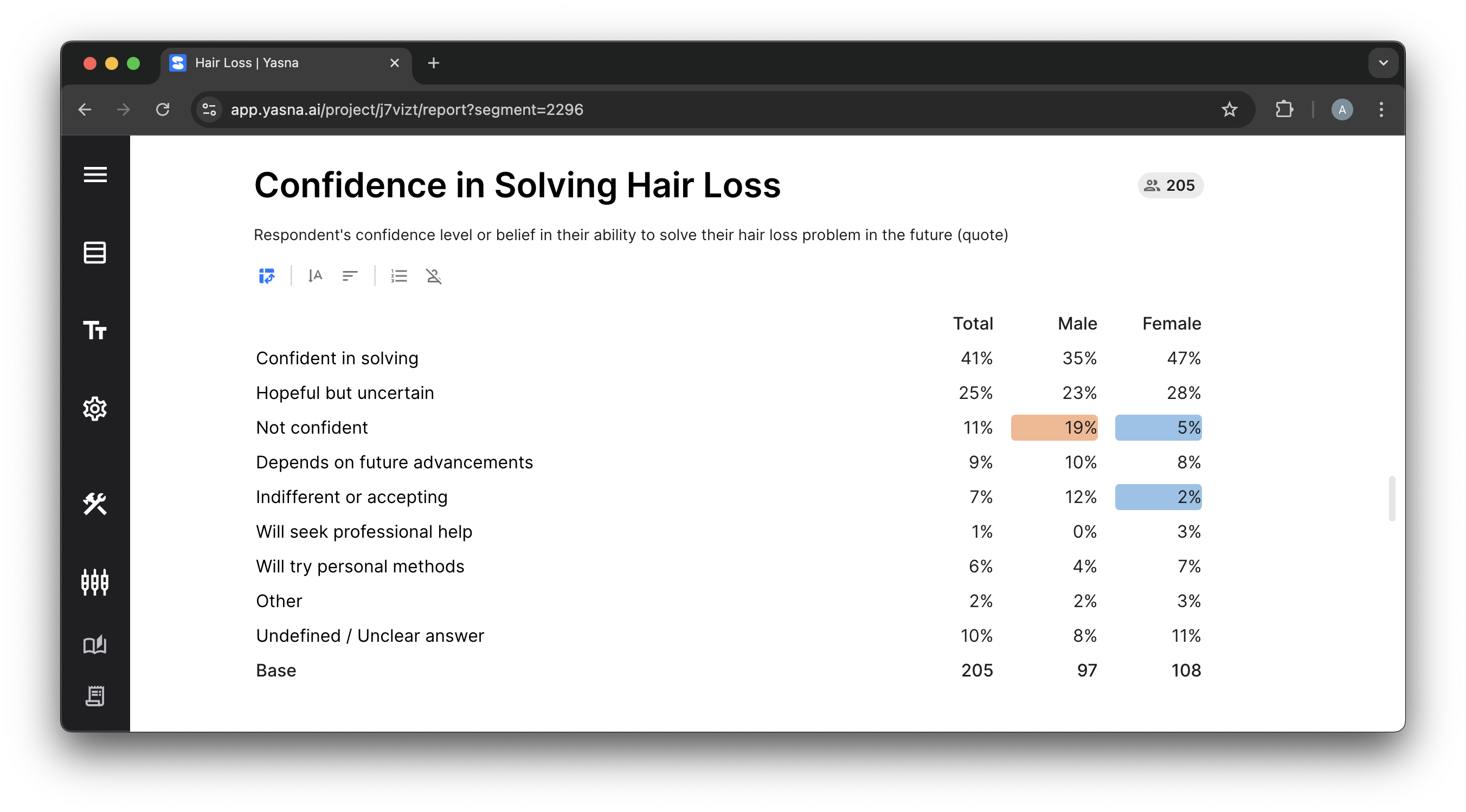No Hair, Don’t Care?
Poland and Italy Get Honest About Hair Loss — Insights Delivered by AI Market Research.

Similar cases:
Looking for The One, or Just Someone?Eco-friendly Bottles with Attached CapsConsumer Insights About Sex ToysHair loss is a sensitive topic that’s not just about looks. It’s tangled up with complex issues of identity and self-worth. To explore it properly, you need a space where people feel safe enough to be honest.
Our AI moderator Yasna creates that safe, judgment-free space — because respondents know they’re talking to a robot, they often feel more comfortable opening up.
This kind of comfort isn’t always easy to find with a human moderator. So, what did we uncover through AI-powered market research? Let’s comb through the findings.
Research Methodology
The tool:
To conduct this market research we used Yasna.ai, a platform that automates in-depth interviews. Yasna’s AI moderator conducts hundreds of asynchronous conversations in 45+ languages, supporting specialists in consumer insights, UX, and CX research across Exploration, Ideation, and Validation tasks.
Trained by experienced researchers, Yasna probes like a skilled human moderator, asking smart follow-up questions to uncover rich insights.
The audience:
We interviewed 205 men and women in Poland and Italy affected by hair loss. To ensure we reached the right audience, we defined the screening criteria, and Yasna handled the rest, asking qualifying questions before proceeding to the main interview.
This research shows just how deeply rooted our beauty stereotypes still are. In both Italy and Poland hair is a symbol of feminine power. A bald woman draws stares and suspicions, even in today’s world of feminism and body positivity. But a bald man is considered natural, sometimes even attractive. (Funnily enough, it’s often the men themselves who say bald men are attractive).
A Physical Change, an Emotional Challenge: How Men and Women Feel About Losing Hair
Hair loss triggered a range of emotions in both countries — fear, anxiety, sadness, and frustration — often tied to concerns about attractiveness, aging, and health. While men were generally more accepting of hair loss as a natural process, our AI-powered research still uncovered emotional depth, thanks to the way Yasna builds trust and draws people out:
Eh, I feel very bad. I look like a pope. – Italian, Male
That said, many men also met the topic with humor and wit:
On a wise head, hair does not grow. – Polish, Male
For women, however, hair loss is not funny at all. In both countries, it’s strongly tied to identity and femininity, with societal pressure to maintain hair as a symbol of beauty:
Hair is an attribute of femininity, when it falls out, we often lose our sense of self-worth. – Polish, Female
I feel sad and incomplete. It’s like a part of me is going away. – Italian, Female
A receding hairline is one thing, but going completely bald is something else. In both countries, bald men are generally seen as fairly normal, sometimes even attractive… or at least, that’s what men like to believe. Baldness in women, however, is taken as a sign of illness or, at least, weirdness.
A bald man expresses masculinity while a bald woman does not express femininity. – Polish, Male
For both men and women it is difficult and scary to be bald, but for women more so – women without hair are viewed either as weird or as sick. – Italian, Female
De-Stress? No Thanks, I’ll Take a Shampoo
Humans are full of contradictions. For example: 48% of Italians and 32% of Poles blame stress for their hair loss. But when Yasna asked how they cope, only 3% of Italians and 2% of Poles mentioned stress reduction.
Why the disconnect? Maybe it’s because in today’s fast-paced world, de-stressing doesn’t feel like a real option. At least not one that gets fast results. Either way, respondents in both countries are much more likely to turn to tangible solutions like shampoos and supplements — more on that later.
Besides stress, other common hair loss triggers included genetics, aging and hormonal changes. Interestingly, 12% of Poles attributed hair loss to illness and 14% blamed vitamin deficiency. Italians, however, barely recognized these as triggers.

Hair Loss Solutions: Poles Go Over-The-Counter, Italians Opt for a Balanced Approach
As for the hair loss combat strategies, Poles are more proactive when it comes to supplements (25% in Poland vs. 16% in Italy), shampoos (31% vs. 11%), and even diet changes (8% vs. 5%).
I take vitamins, hair loss supplements and use shampoos. I wanted to take matters into my own hands and see if the cosmetics and supplements available on the market work. – Polish, Female
It seems that in Poland, people aren’t looking for drastic solutions — they are expensive, intimidating, and often feel like a last resort. So instead, many choose to do something rather than nothing at all.
For brands, this signals an opportunity to position less invasive, lower-commitment solutions like supplements and shampoos as approachable first steps. Emphasizing safety, affordability, and gradual progress can resonate well with cautious consumers who aren’t ready for transplants or clinical treatments.

Italians, in contrast, show slightly more interest in both medical treatments (7% in Italy vs. 5% in Poland) and natural remedies (11% vs. 9%), likely viewing these options as complementary rather than mutually exclusive. This aligns with findings from another international case study, which revealed that Italy’s northern neighbor Austria also favors a holistic approach to healing.
For brands targeting Italy, this suggests positioning hair loss treatments as both effective and “gentle” or “balanced.”
To Be, or Not to Be Bald: Attitudes Towards Hair Transplants
Affordability is a universal concern. Both Italian and Polish men agree that cost is a major factor in deciding whether to get a hair transplant. But that’s about the only thing they see eye to eye on. Cultural attitudes play a big role in shaping how the two groups view the procedure.
Italian men are twice as likely to say “Si” to a hair transplant, with 37% considering the procedure, even though they emphasized the fear of the operation more than Polish respondents.
For them, appearance matters more and thick, healthy hair plays a major role in attractiveness. One Italian man even joked about wanting to look like the voluminous-haired singer-songwriter Angelo Branduardi:
I’ve seen how transplants work, I’ve seen a lot of people who have done them, everybody is happy, so I’m going to go to the transplant sooner or later and be Angelo Branduardi again, oh well! – Italian, Male

Polish men are far more skeptical about hair transplants, with 36% saying “No,” and another 36% unsure. This hesitation likely stems from the fact that the procedure feels expensive and intimidating, so they lean into the idea of embracing hair loss as a “natural” process. Many also framed baldness as more masculine, using it as a way to reframe the issue on their own terms. As one respondent put it:
It’s a procedure for conceited, insecure men and it’s not masculine. – Polish, Male
Polish men were also uniquely worried about health complications, such as skin cancer, and voiced a philosophical resistance to cosmetic procedures:
Nature should not be deceived. – Polish, Male
These views, along with cost and health concerns, explain why only 18% of Polish men are open to transplants, suggesting they may be more interested in non-surgical or affordable alternatives.
Italian men really care about staying attractive. They’ll say a bald guy can still be handsome, but they’re holding onto their hair as long as they can. Polish men, though, seem to hide behind the idea that baldness is a natural process of aging. And perhaps, they aren’t as bothered by looks as Italians — grooming is not as ingrained in Eastern European culture. There’s still that mindset: “even if I’m chubby and balding, I’m a man and this is manly!”
Looking Ahead: Hopes and Expectations for Future Hair Loss Solutions
Only 2% of women and 12% of men said they didn’t care if they solved their hair loss problem. The rest are harboring various degrees of hope. Women are 1.3 times more confident than men about addressing hair loss and are also more proactive, with 3% seeking professional help (vs. 0% men).
Brands have an opportunity to educate and engage, particularly targeting men, to shift their mindset from acceptance to action. Women, with higher confidence and intent to act, are a prime audience for immediate engagement.

When it comes to future solutions, both Polish and Italian respondents are hopeful but their expectations differ. Poles put their faith in scientific breakthroughs, which matches their common use of over-the-counter solutions — they want results, but trust science to deliver them.
Italians, on the other hand, lean toward a mix of lifestyle changes and medical treatments, favoring a more holistic approach where natural remedies and professional care go hand in hand.
For brands, this means investing in science-backed products for Poles, while promoting balanced, lifestyle-friendly solutions for Italians.
Key Takeaways
Hair loss is deeply emotional: Across Poland and Italy, both men and women linked hair loss to self-image, aging, and health. Women expressed stronger emotional responses, often tying hair to femininity and identity.
Stress is blamed, but rarely addressed: Many respondents cited stress as a key cause of hair loss, yet very few mentioned stress reduction as a coping strategy, preferring visible solutions like shampoos or supplements.
Women are more proactive: Women are more confident and action-oriented when it comes to addressing hair loss, representing a key segment for educational and marketing efforts — largely because they feel pressure, as hair loss in women is often seen as a sign of illness or abnormality.
Cultural attitudes shape transplant decisions: Italian men are less willing to accept hair loss and more open to hair transplants, viewing them as an investment in appearance. Polish men, however, tend to see baldness as a natural part of aging and a mark of masculinity. They’re more skeptical about transplants, often citing cost, health risks, and a belief that there’s no need to “fix” their looks.
Future hopes for hair loss solutions diverge: Poles are looking to science for breakthroughs in over-the-counter solutions, while Italians believe that a mix of medical treatments and lifestyle changes will help fight hair loss.
Transforming Conversations Into Clarity with Yasna
Hair loss may seem like a universal experience, but as this study shows, emotions, coping strategies, and expectations vary widely by gender, culture, and personal mindset. From the Polish cost-consciousness to the Italian preference for holistic balance, brands have a real opportunity to tailor solutions that meet people where they are, emotionally and practically.
These cross-cultural insights were made possible by Yasna, whose AI-powered interviews go beyond surface-level answers to uncover the hopes, fears, and motivations behind consumer behavior, even on sensitive topics.
By building human-like rapport and encouraging honest conversations, Yasna helps brands not just understand what people do, but why, providing a powerful foundation for more resonant products, messaging, and innovation.
Continue reading
Top picks about AI-powered interviewing




